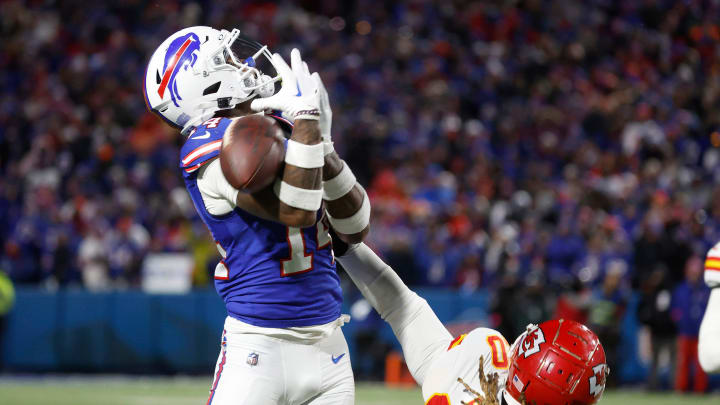ESPN criticizes Bills for Stefon Diggs trade, gives them a middling offseason grade

To say that the national reaction to the moves executed by Buffalo Bills general manager Brandon Beane throughout the 2024 NFL offseason was mixed would be an understatement.
The executive heavily retooled a roster that has been one of the league’s best throughout the past half-decade, moving on from stalwart starters like Stefon Diggs, Micah Hyde, Jordan Poyer, Tre’Davious White, Mitch Morse, and Gabriel Davis only to replace these players with internal contributors, value free agents, and rookies. The moves signaled a “transition” from one core to another; the team, though not as stout now as it was just a few months ago, is better positioned for sustained success given its younger roster and healthier salary cap situation.
Several pundits around the NFL fundamentally disagreed with Buffalo’s maneuvers given the presence of otherworldly quarterback Josh Allen, an elite signal-caller who is very much in his prime at this juncture. Taking a purposeful step back, to some, was seen as a potentially unwise decision that does not maximize Allen’s window of contention.
Related: 7 under-the-radar Bills to watch at 2024 training camp
ESPN’s Seth Walder falls into this camp. In a recent article grading every NFL team’s 2024 offseason, the writer gave the Bills a C+, criticizing the team’s decision not to land a bigger fish at wide receiver after dealing Diggs to the Houston Texans. The grade is the lowest in the AFC East and 10th lowest in the NFL.
“Buffalo addressed the position with its first selection in the draft, Keon Coleman, and is presumably hoping tight end Dalton Kincaid can help fill the receiving void, too,” Walder wrote. “Third-year receiver Khalil Shakir looks like an emerging talent with 2.05 yards per route run last season, and the Bills signed free agent receivers Curtis Samuel, Mack Hollins and Marquez Valdes-Scantling. Buffalo did not have a ton of options after dealing Diggs, as it's tight up against the salary cap this year and next. But the Bills didn't have to trade Diggs, and once they did, they should have looked at a higher-caliber veteran at the position.
“Elsewhere, the team made solid moves to lock up underrated talents such as defensive tackle DaQuan Jones, cornerback Taron Johnson and Dawkins. They are all key players who should help Buffalo maintain as a Super Bowl contender ... if Allen gets receiving help.”
Buffalo, sure, didn’t have to trade Diggs, but it certainly wasn’t a bad decision. Diggs showed signs of decline down the stretch of the 2023 season, notching just 37 receptions for 349 yards from Weeks 10–18. An optimist may attribute this dip in production to Buffalo’s Week 11 offensive coordinator shift to Joe Brady, but at 30 years of age, there are justifiable causes for concern about Diggs’ longevity. Factor in the fact that Diggs had shown signs of being disgruntled and that he was set to earn roughly $25 million over the next three seasons, and one can understand why the Bills felt compelled to move him this spring.
Related: Bills' Top RB trails Chiefs' Pacheco, Dolphins' Achane in Fantasy Rankings
Walder also criticizes the team for not pursuing a higher-caliber receiver just one sentence after explaining why they neglected to do so. Buffalo is tight against the salary cap, even more so after incurring a $31 million dead cap hit after dealing Diggs. The Bills traded the perennial Pro Bowler to create long-term salary cap flexibility; immediately working itself into the same financial pickle by acquiring another high-earning pass-catcher this offseason would’ve been unwise.
Buffalo is well positioned to pursue a high-profile wideout in the coming years given its created breathing room, but this offseason simply wasn’t the time. It instead hopes to get immediate production out of the pass-catchers Walder mentions—Kincaid, Shakir, the trait-sy Coleman, and Curtis Samuel, who is reuniting with the offensive coordinator who led him to a career year in 2020.
It’s fair to disagree with and question Buffalo’s offseason strategy, but to criticize the team for not pursuing a big-name wide receiver seems disingenuous. The entire offseason was executed with the goal of elongating the team’s championship window and creating financial flexibility—the move for an additional elite pass-catcher, while possible in the future, was never coming this spring.
